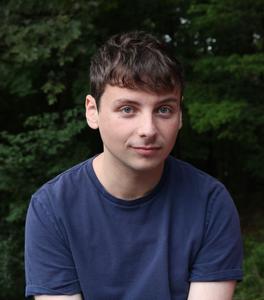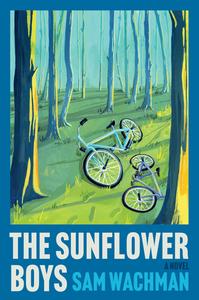
|
|
| Sam Wachman (photo: Paul Shelman) |
|
Sam Wachman is a writer from Cambridge, Mass., with Ukrainian roots. His short fiction has appeared in Sonora Review, Berkeley Fiction Review, and New England Review. The Sunflower Boys (Harper; reviewed in this issue) is his debut novel.
Tell us how you came to write The Sunflower Boys.
I began writing the novel long before the current events that made it so relevant. My family came to the U.S. and Canada from Ukraine, several generations ago. I grew up with the vague idea of Ukraine as an ancestral homeland, but one that we, as Jews, had a complicated relationship with. Ukrainian history is inextricably intertwined with Jewish history, but in a painful way. There was an urge to cut away the past and say, We're Americans now.
I visited Ukraine as a teenager, and found an unexpectedly intense sense of homeland. So many of the mannerisms and mentalities I grew up with were very present over there. It was like seeing a picture of your grandparents in their 20s: it's different, but it's clearly family. I taught English to kids at a tiny independent school, and became proficient in the Ukrainian/Russian pidgin dialect spoken in that region, where my mom is from. I started drafting a novel set in Ukraine before Covid, in 2019, told from the perspective of a kid around my students' age. There was no theme of war in that draft, because there was no full-scale war then. It didn't affect people's daily lives in the way it does now.
I studied in Denmark in college, and was making plans to move to Ukraine semi-permanently. Then Russia invaded, and suddenly my friends and my students were in Poland and Moldova, in basements and train stations and IDP camps. I had this feeling of what can I do? I wanted to be with my community and bear witness in a complicated but real way. I failed out of my last semester of college, because I was volunteering as a translator and EMT with refugees at the Berlin Hauptbahnhof, the train station. Later, back in the U.S., I helped settle Ukrainian families in the Boston area.
I was frustrated with the space Ukraine was occupying in the American cultural consciousness. There was a sense that Ukraine was categorically a war zone, a place where bad things have always happened and always will happen. That was not my country, the country I knew and wanted to show the world. I wanted to bring both realities together--the war, and also the country I had lived in and loved and experienced.
 What eventually pushed me to sit down and write was volunteering at a camp for Ukrainian kids just over the border in Romania. All my students who had been scattered throughout Europe made it to this camp and reunited. They had grown up physically, but also emotionally, way beyond their age. They were trading stories. I said, You guys should write a book, and one of them said, We're busy. You do it.
What eventually pushed me to sit down and write was volunteering at a camp for Ukrainian kids just over the border in Romania. All my students who had been scattered throughout Europe made it to this camp and reunited. They had grown up physically, but also emotionally, way beyond their age. They were trading stories. I said, You guys should write a book, and one of them said, We're busy. You do it.
Artem is an artist, and his sketchbook appears throughout the novel. How did that become a narrative thread?
I was struggling with pacing, and trying to organize my draft in a manageable way. So Artem's drawing helped me organize the narrative--but his sketching is also a way of sublimating trauma. I worked in a Boston public school where 80% of the students were from the Northern Triangle of Central America, and they had experienced migration in some of its ugliest forms. One of the most therapeutic things we did was sit together and draw. I still get letters and postcards from my students back in Ukraine, and they often include drawings--which are not all directly related to war and destruction. They're processing things in ways that sometimes adults underestimate.
The book deals with Artem's struggle to accept his own sexuality and others' reactions to it. Can you talk about that?
No matter where you grow up, if you've developed feelings for your best friend, it might kill the friendship. And in Ukraine, you're going to get mixed reactions to being gay. I think there's a tendency in literary fiction to marry the gay and the tragic, and there is certainly a lot of tragedy in this book, but that particular subplot ends on an ambiguously hopeful note. More broadly, masculinity--how a boy should be, how a man should be--is a question Artem is struggling to answer throughout the novel. His relationship with his brother, Yuri, is unambiguously masculine and also tender. I wanted to depict that bond that exists between boys--ultimately caring and affectionate and symbiotic.
How did you research the details of the refugee experience?
Everyone I know from Ukraine has experienced some form of displacement. They are my close friends, so they were willing to talk to me about it. One friend gave me all the details for Artem and Yuri's train journey, and I interviewed a friend of a friend about their later journey through the mountains. I also learned about the people they would have met: some people are opportunists, and will use societal upheaval to their own ends. And some people are good-hearted, but war warps their perceptions and actions. War brings out the worst in most people, and the best in a few people.
Artem and Yuri's dad has been working abroad. How does his absence affect their childhood experience?
Having that long-distance thing with a father working abroad felt like an essential part of Ukrainian childhood in the 2020s. I rarely met my students' dads, because they were often working abroad--in Germany, in Poland, in the U.S. There were plenty of lawyers and doctors who were working construction. Artem's tato is doing this to send back remittances to his sons, who don't really understand why he's not there with them. This is a sacrifice a lot of Ukrainian dads make. Would it be better if he were there and they had much less to live on? It's a complicated question.
How do you think this story may affect American readers' perception of Ukraine?
I hope it will give some context: that people will understand what's at stake, what has been lost, and what is in peril of being lost. A whole thriving country with 44 million people and its own language, culture, literature, cuisine, traditions, in-jokes, its own Internet, its own memes--it is every bit as much a human experience to live there as it is to live in America.
I think Americans think of certain places as synonyms of squalor or war. When the war started, I think most Americans didn't know where Ukraine was, or thought it was a part of Russia, or associated it with Chernobyl--none of which is very good branding. There are problems; it's poorer, and some aspects of life are not up to American standards. But I liked it better than living in the U.S., in some ways. I wanted to give a different angle than the geopolitical headlines we see. I wanted to share a reflection of how it felt: this is what I saw and bore witness to. --Katie Noah Gibson

